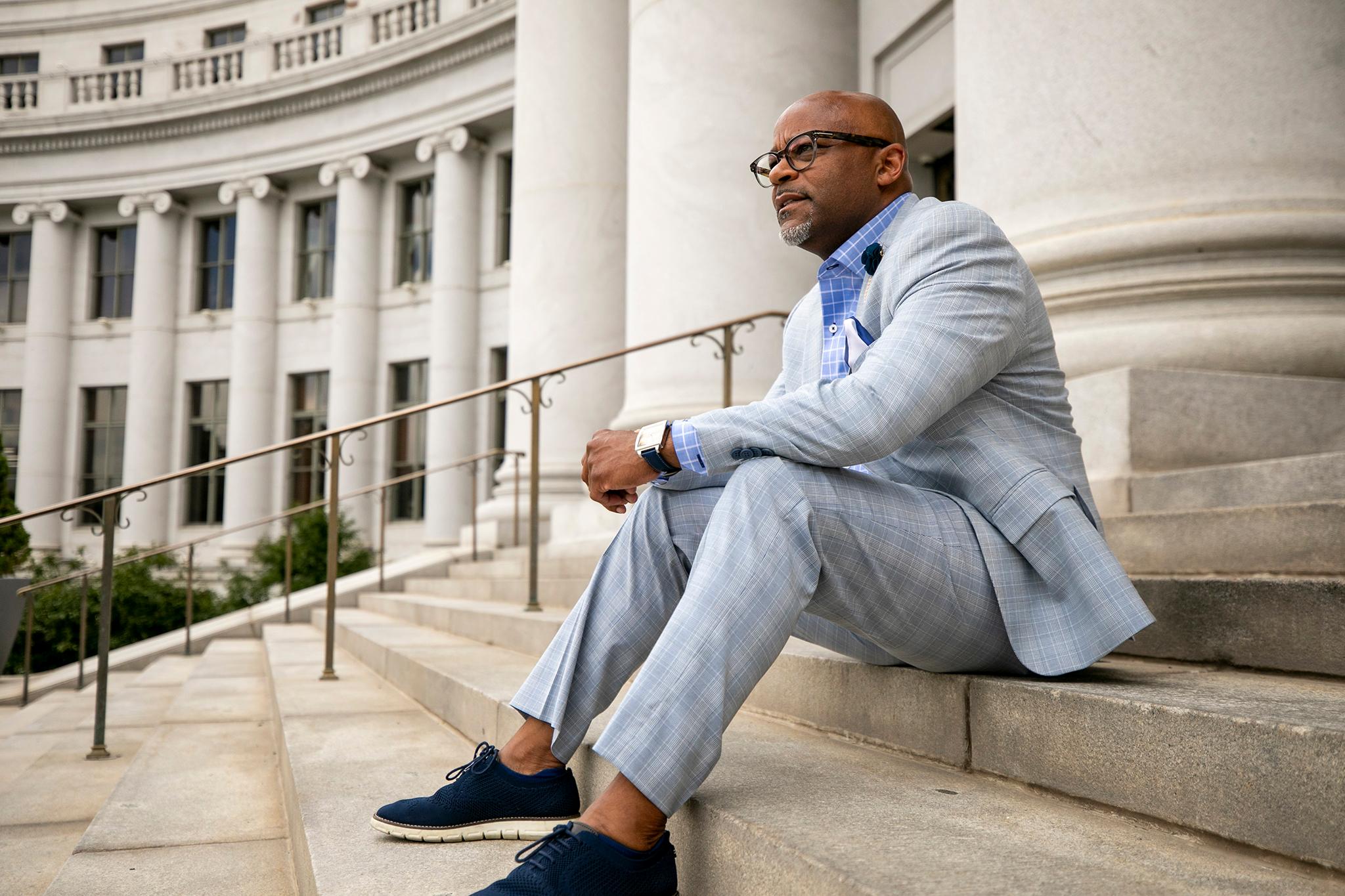As Michael Hancock's third term as Denver mayor comes to an end, Denverite met him in his office at the City and County Building to discuss the city's enormous growth, the displacement of longtime residents, the pandemic, the Urban Camping Ban and the increase in taxpayer-funded settlements over law enforcement misconduct.
We spoke about the expansion of Brighton Boulevard, the arrival of nonstop flights to international destinations, the effect of serving in office on Hancock's family and what got him out of bed in the morning during the toughest times.
The mayor looked back on what he says were his accomplishments -- and some of his misses -- in his time at the helm.
Editor's note: The interview has been gently edited for clarity.
Denverite: Two decades from now, when people are going to talk about Mayor Michael Hancock's legacy, what are they going say your biggest accomplishments are and also the biggest policy misses?
Michael Hancock: I think that people will really look at the resiliency of this administration and just be amazed at how we were confronted with unprecedented challenges and really came together to pull the city through each and every one of them -- whether it was the Great Recession, when we came in; certainly the unprecedented growth that came our way; and ultimately the pandemic, the social unrest following the murder of George Floyd, the immigrant issues; and even before that, the four years of Trump and then the migrant issues that hit. This city and this administration has proven to be the most resilient I've ever seen -- over 12 years. And that's just an amazing moment.
I think that in terms of policy misses, I think obviously people will always question: "How did you respond to that unprecedented growth?" And the affordability issue has been the one that we have been most challenged with as a result of that growth. As with most interpretations of missed policy, people don't understand the full chronology of how those issues come about.
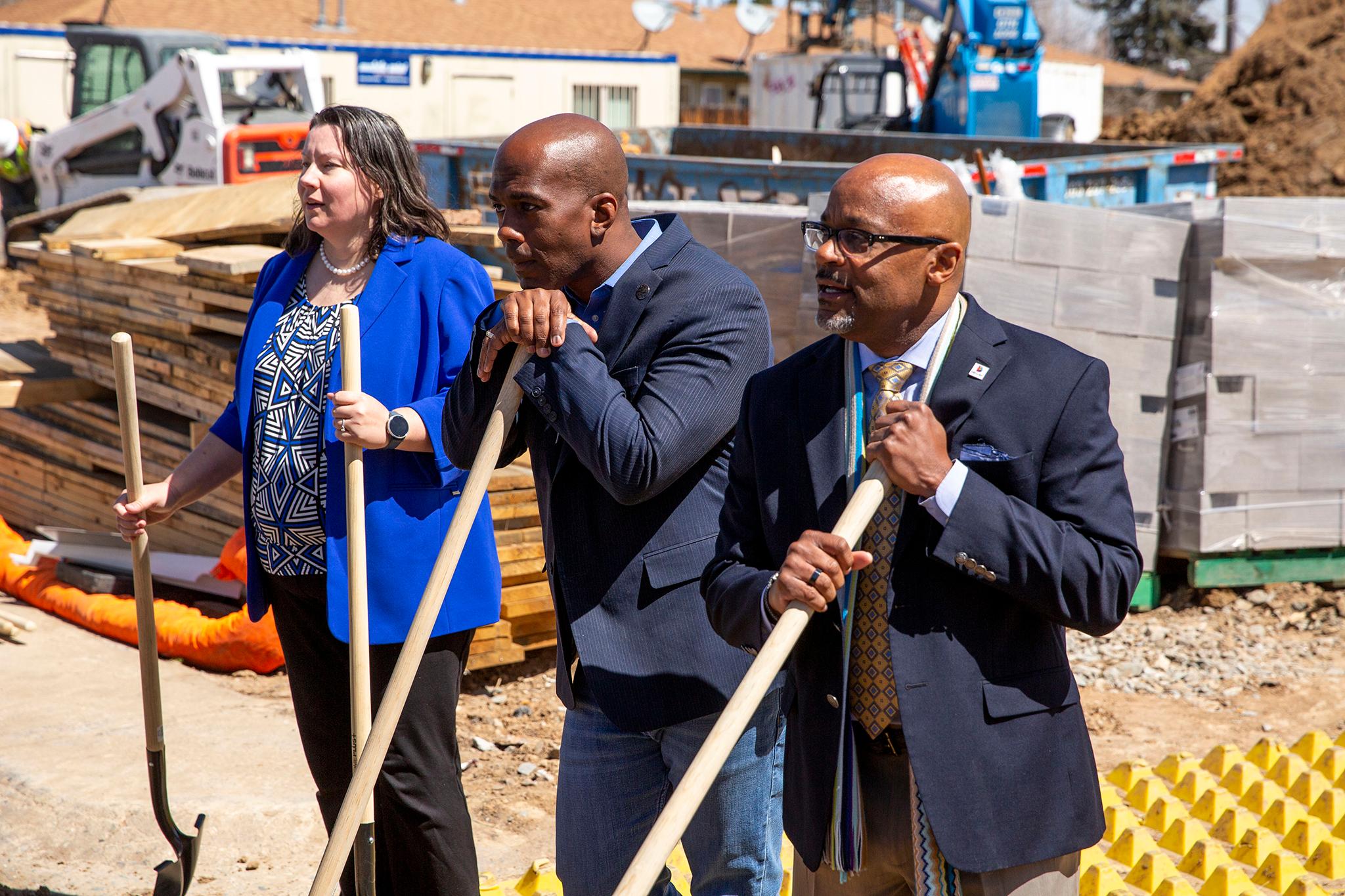
The growth, the miss around affordability are not typically city issues, or at least affordable housing isn't. But we responded to it. But you can't get up on top of that kind of growth. Not 30% like we saw in 10 years. It was magnanimous and unfortunately has impacted our affordability as a result of it.
Denverite: Was there a moment when it kind of dawned on you: We are growing way, way fast, and the consequences are big? Do you remember that?
Hancock: Yeah, I do. I remember the conversation with Paul Washington at the time, our executive director of economic development. And Paul came to see me in 2013 in one of his regular updates, and he said, "Mayor, we have kind of an amazing dynamic happening in Denver. One is we're growing exponentially, and two, we have a run on affordability, on affordable housing. And it's going to create a problem if we don't find a way to get up on it.
And it was the first time, probably late 2012, early 2013, when we had that conversation. It was the first time that any mayor in Denver's history took General Fund money and put it toward affordable housing. You may look at the history or chronology of our administration. We had a three-by-five challenge, and we started allocating money for affordable housing, not really understanding the size and scope of it. It would hit us around 2014, 2015. "Oh my." A lot that came with it was awesome, but a lot of the results, which typically are delayed, the impacts of that growth are what we're seeing today.
Denverite: Talk about some of the conversations at that point you were having with people in the community who were maybe facing those economic pressures.
Hancock: I think the economic pressures -- it depended on where you were in the community in terms of your level of readiness. You've got to remember, our economy began to really take off, and people were really enjoying Denver. We were named the number one city in America two times, in consecutive years. Best place to live in America. A lot of things where people go, "Oh, you're not that," But we were there. We were the best place to start your career. Best place to start a business. Best place for entrepreneurs. We were there! Best place to raise a family.
And then one day, feeling pretty good about the direction of the city, I got stopped on the 16th Street Mall by a gentleman who said, "Mayor, what about those of us who are being left behind right now?" And I said, "Share with me what you're talking about."
"You know, those of us who are unable to get the jobs that are coming with this new economy in Denver. Those of us who can't afford to live here anymore." And it was that moment where it was like, "You know what? We've got to always make sure that we bring people along."
And I think this is where the concept of equity came to mind. Not everybody is ready, right? And not everybody starts from the same place. Policies and opportunities don't fall on people at the same rate.
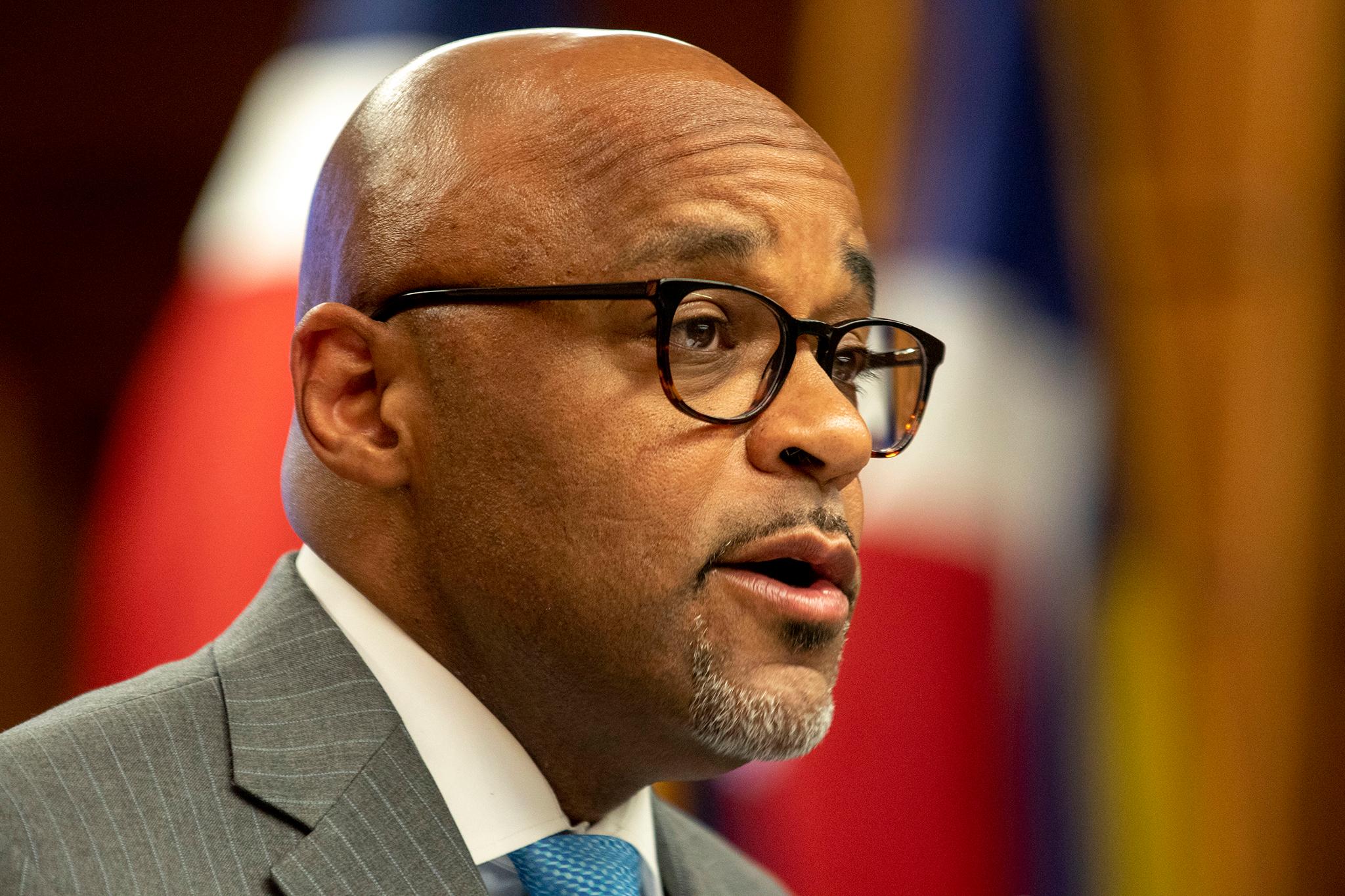
I started thinking more about our policies and making sure: What about those who are not as ready and prepared to take part in the new economy that's in Denver, whether it's technology or whatever was emerging at the time? What do we do about those? How do we make sure people are getting retrained and begin to catch flight in this new economy? How do we address the issue even more deeply on the issue of affordable housing? It was the first time I started thinking about a more permanent funding base for affordable housing. So it was that kind of thing where you can almost begin to see my shift in my conversation: "Yeah, we're doing great. But we've got to make sure we bringing everybody along in this economy."
Denverite: Landmark city projects have been something that have defined mayors' legacies. For Federico Peña, it was DIA. For Wellington Webb, the park system.
Hancock: The Sports Complex for Webb. Webb did a lot of stuff.
Denverite: What was it for you?
Hancock: You know what? I think for me -- people may look at it differently -- but I'll tell you, I look at the redo of Brighton Boulevard, the rebuilding of Brighton and the attraction of new private development around Brighton and just that whole new area changing. I called it the Corridor of Opportunity. The promenade that's along the river and the largest investment in South Platte River in Denver's history: $300 million. And National Western and keeping the Stock Show in Denver. It was leaving when I became mayor.
I just had Parks and Rec folks in here going, "This administration added almost 20% more new park space to the City of Denver's inventory and took rec centers to areas that didn't have them: Central Denver, Westwood and others."
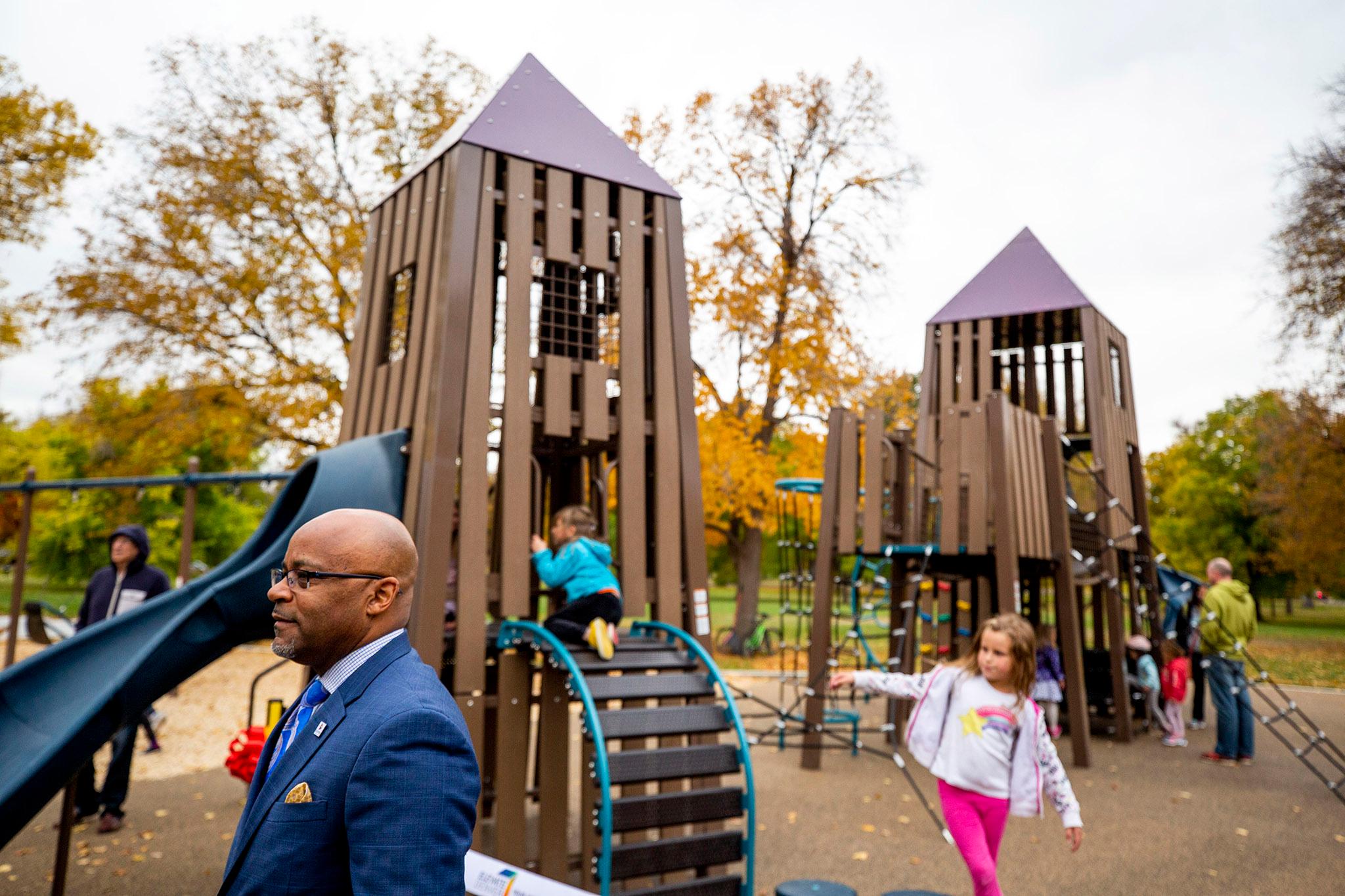
We redid all of Sun Valley -- called the poorest neighborhood in Denver when I became mayor. So we have changed it. There's housing. It's getting a brand new park, riverfront property for people who are some of the lowest income in the city.
So I'm proud of those groundbreaking moments, proud of the expansion of the airport and Convention Center. But I think when you look at Brighton Boulevard and what happened in Union Station under our watch, those are the things that I'm most proud of.
Denverite: Aerotropolis was this concept that was touted widely. What happened to the project? What happened to the word and what of that did get finished and what needs to be finished?
Hancock: Aerotropolis was always laid out to be a multi-decade effort. And if you go out to the airport today, you see the Aerotropolis under construction. It is happening.
So a couple of things happened. One, we got a groundbreaking agreement, a regional agreement, to develop what we call Airport City around the airport. That was unforeseeable, unfeasible before I became mayor. Adams County didn't care much for Denver, and Denver didn't care much for Adams County. We were not going to work together. They were like, "Give us back our land. If you're going to try to build around it, give us back our land." And that's how we started the conversation: "You're not getting your land back. And if we want this airport to flourish, and if you want to flourish, we've got to find a way to jointly work together to make it flourish." And after three years of negotiation, we came up with a regional deal to jointly market and jointly promote development in the area.
Today, you see multiple, multiple development efforts going on, a tremendous amount of speculation. There are a lot of cranes out at the airport, around the airport today. You see neighborhoods that are expanding. Green Valley Ranch is one of the fastest-growing neighborhoods in the city. That area east of Piccadilly, which is known as High Point, is flourishing. Look at Commerce City. Look at Reunion. Look at those areas out there. They've sold more homes and new commercial space than in many regional areas of town. A lot of that had to do with regional partnership and really the promotion of Aerotropolis
Denverite: As you're leaving office. What's keeping you up at night?
Hancock: Probably no surprise here. Gun violence in our city. We have not been immune to the national growth of gun violence around major cities. I'm still every day concerned about people experiencing homelessness in Denver and how we continue to address that and a lot of mitigating circumstances around that: the growing fentanyl challenge and opiate challenge and meth challenge in our city.
We have just become a major city, a global city, and unfortunately, a lot that comes with what has befallen our city. But we're equipped to deal with it, and we've got to continue to deal with it. We've just got to stay together as a city and have leadership that understands we've got to do this together. That as a mayor, as a City Council, you can't do this alone. It takes all of us to be engaged and be a part of the conversation as well as implementing the solutions.
Denverite: Do you plan to continue to have a role in the city and serve the city in some capacity? And if so, I'm curious about that.
Michael Hancock: Yeah, I'm going to take some time off and just get away from it all for a while and disappear. I don't think Mayor Elect and then Mayor Johnston needs my face and presence. It's certainly a lot easier to begin the process of running the city and be seen as the leader if your predecessor is not constantly in your face and doing media and things of that nature. So I'm going to get outta the way and just take a low profile in the City of Denver and be quiet for a while and really kind of begin to heal from the trauma -- [laughs] -- of 12 years of 10-, 12-, 14-hour days and six-and-a-half days a week, and breathe a little bit and reconnect with my children and my grandchildren and do all that.
But I'm going to be in Denver. I'm going to work on issues nationally. I have some passion areas -- voter rights and race relations -- that I'm really concerned about and really want to engage in. So I'm going to do those things, but on a more national level.
Denverite: You described this trauma of the last 12 years, which no doubt had to be the case. I'm curious, through those years, how did you take care of your mental health? How did you stay sane? I mean, you dealt with threats, you dealt with attacks, you dealt with all sorts of stuff. How did you do it?
Hancock: Well, first of all, it's a journey. And when I say trauma, I mean it in the boldest sense of the word, and not necessarily a negative sense of it. It just kind of captures the constant fluidity of challenges and opportunities that come. It's a journey. I mean, self-care is a journey. My faith is very important to me. And so, you know, making sure I always took time for faith and the exercise of my faith. And I stayed close to my faith, and I stayed close to prayer. And exercise. I exercise regularly. Instead of going to lunches, I learned early in the administration or my term: Stop going to sit at those lunches. And I would go exercise. Now I go exercise. I come back to a quiet, private lunch here and get that break in the middle of the day that allows me to breathe a little bit. And being willing to get away from it on the weekends when you can. Say no to some things, and say, "I'm not going to do that. I'm going to just relax."
I will tell you this. One of the more prophetic things that one of my predecessors told me when I took this job was that what people don't measure is the human toll of this role. It's an honor. It's a privilege to serve in this role. I don't have any complaints about being elected. I don't complain about it, because I asked for it. But I recognize there's a human toll. I lost a marriage. I lost friends in this thing. Other mayors have done the same thing who come before me. We lost marriages. We lost relationships with people we cared about. And they told me, "When you're finished, you'll look around, and the people who are around you are going to be different from the people you're going to start with, including people you consider as close friends."
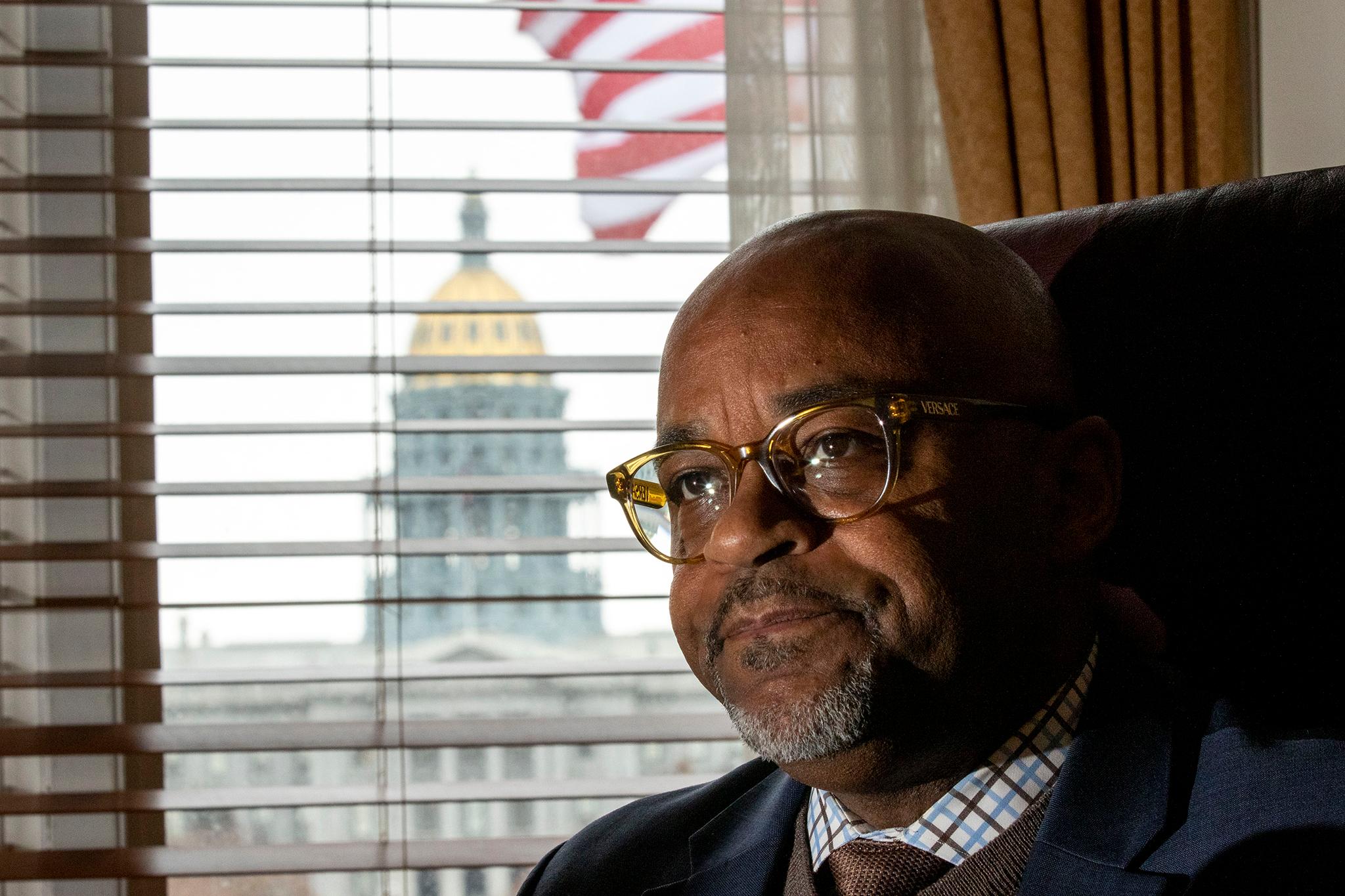
And so, yeah, there's a human toll. And so you have to take care of yourself mentally. But I've got to tell you, we had challenges that no other mayor saw. A pandemic, the unprecedented social unrest that occurred as a result of the George Floyd murder, four years of Donald Trump.
There were times when I sat back and said, "This stuff sucks. This is hard." And particularly during the pandemic, I had to step back and say, "Now I'm being impacted mentally." And I had to breathe. I had to find new ways to just take care of me and slow it down a little bit and just kind of figure it out. People were dying. I stopped counting at 19 friends and family that I knew I lost. It was tough.
Denverite: Talk about one campaign promise that you made 12 years ago that you pulled off that you're proud of, and perhaps one that didn't pan out?
Hancock: That's easy. I made a campaign pledge that in two years, I would have a direct flight to Japan. And in a year, we got a direct flight to Japan. That was one that, when I remember saying it, everybody kind of gasped. It was in front of a Chamber lunch. It was a campaign forum, actually. And I made that pledge. I said, "We will get a direct flight to Japan, and we'll do it within my first term." And we got it done. We got it at least announced in the first year, year-and-a-half of being in office. So I was very proud that I was able to deliver that.
But I've got to tell you, I knew that there were over 20, 25 years of effort to make that happen. And I was very sure to make sure I celebrated Federico Peña, Wellington Webb, John Hickenlooper -- all who have gone over to Japan saying, we need this direct flight -- and all the business community that played a role in it as well.
Let me see. Was there a campaign pledge that we made that we didn't necessarily pull off? I think we accomplished all of our campaign pledges. And I'm not trying to be braggadocious. I think we met our commitments or at least the promises we made.
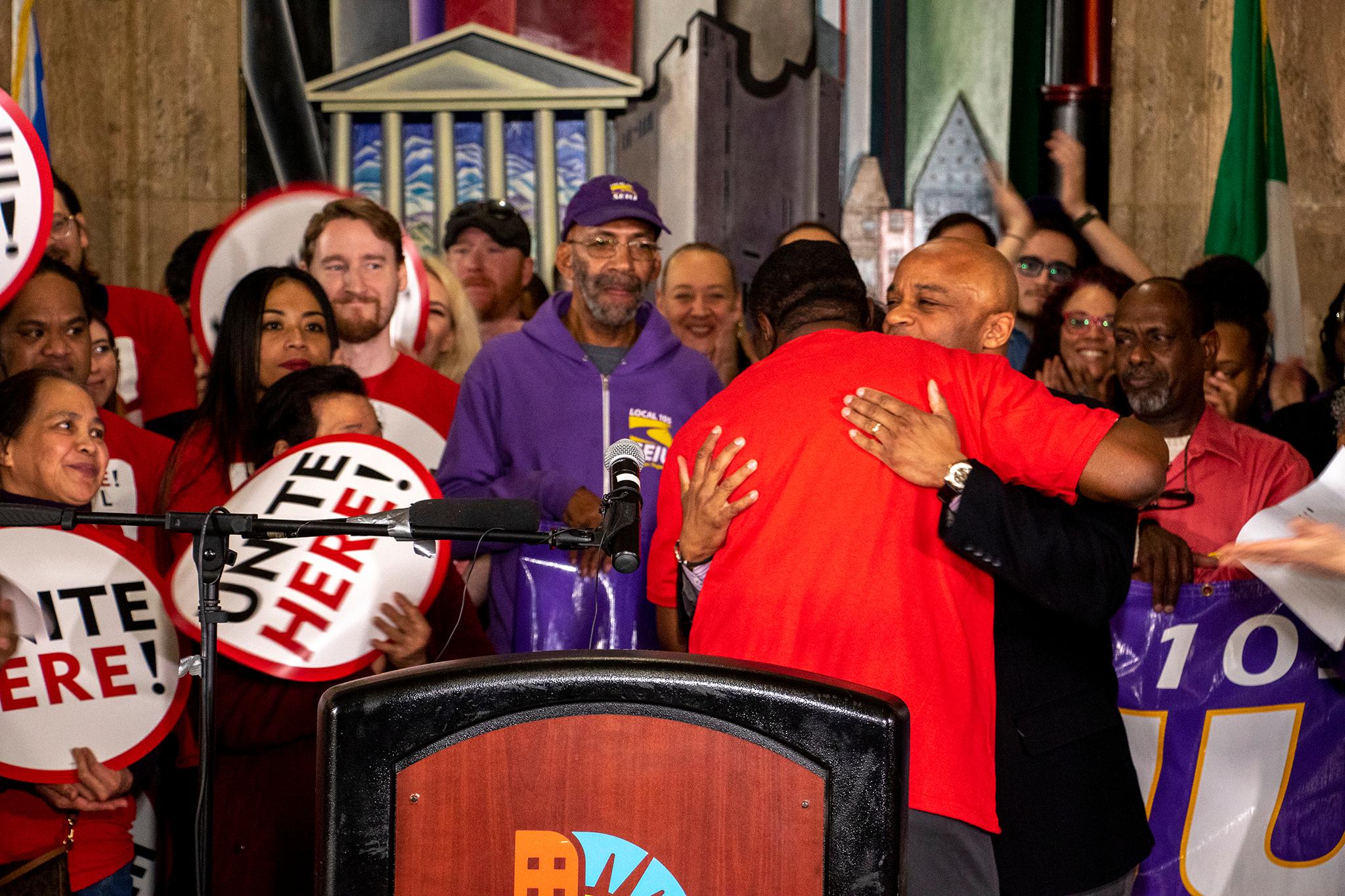
One of the things I believe is that "we are all Denver." I think there were times when people didn't feel like they were part of the new Denver. And that's what I'm talking about. As we became our new Denver, did we really bring everyone along? Or should we have been a little more in tune with the fact that not everybody was going to be prepared to go. I think we corrected quickly and began to turn. But it's like turning a ship, you know? You've got to get people trained. You've got to get them to believe and trust that what you're trying to do is trying to be inclusive and to make sure everybody comes along.
Denverite: That's a decades project
Hancock: That's a decades project. I learned a lot. For example, people talk about gentrification, involuntary displacement, and we went and studied that stuff. And we came to find out that it doesn't just happen. This is decades of things beginning to shift that most people don't see. It's slow, very systemic. It's change that happens. And most people don't even know this is happening until all of a sudden you look up and where you had a majority African-American community, now it's a lot of white people, and properties have gone through the roof and value wise. And it's like, when did this happen? And you think back. When I came in, we looked at some neighborhoods and they actually brought me a map and said, "Mayor, this neighborhood's gone. It's gentrified." And I think it was Curtis Park, for example. Montbello: Gentrified. But this neighborhood is evolving. And here's what we know.
The city knows before anyone those things that are triggering gentrification. People are planning to build buildings. You're making investments, doing bonds, you're putting in libraries, rec centers, parks. Those are things that trigger gentrification, because you're making the neighborhoods very attractive to people and so you're bringing in jobs.
For example, Curtis Park, surrounded by hospitals within walking distance or very short rides or a bus to a hospital or close to downtown, right? As downtown began to recover in the late '80 and early '90s, people wanted to live close to their jobs. So they started buying up houses. So it's the systemic, small things that we see that we're not paying attention to. And then all of a sudden, you got a wholesale change, and people go, where did this come from? Who triggered this? And it's decades in the making.
Denverite: Your administration launched the urban camping ban. The constitutionality of that was tested. Your administration then pivoted toward sweeps that have gone by various names over the years. This is a policy that John Parvensky, retired head of the Colorado Coalition for the Homeless, described as a failure. Doctors from Stout Street Clinic, University of Colorado Anschutz, Denver Health, they also describe it as a failed policy. Homelessness has multiplied in your time in office and encampments are throughout the city. Looking back, are there changes you would make to that policy? Was it the right one? What's the legacy?
Hancock: You know, here's the deal. There's no greater responsibility as mayor I have than the safety and well-being of the residents of our city -- visitors and residents of our city. I have not been so closed off to the policy, or at least alternative to the policy, that has been absolutely no.
When the Anschutz people or Parvensky or whoever else say, "you've got to change this, it's not working," what they misunderstand is that's not our homeless policy. Our homeless policy is not to go sweep people off the street. When we go in and clean up those encampments, we are addressing health and safety threats, risks to not only the people in the encampments but people who live, walk, who are visiting around those encampments.
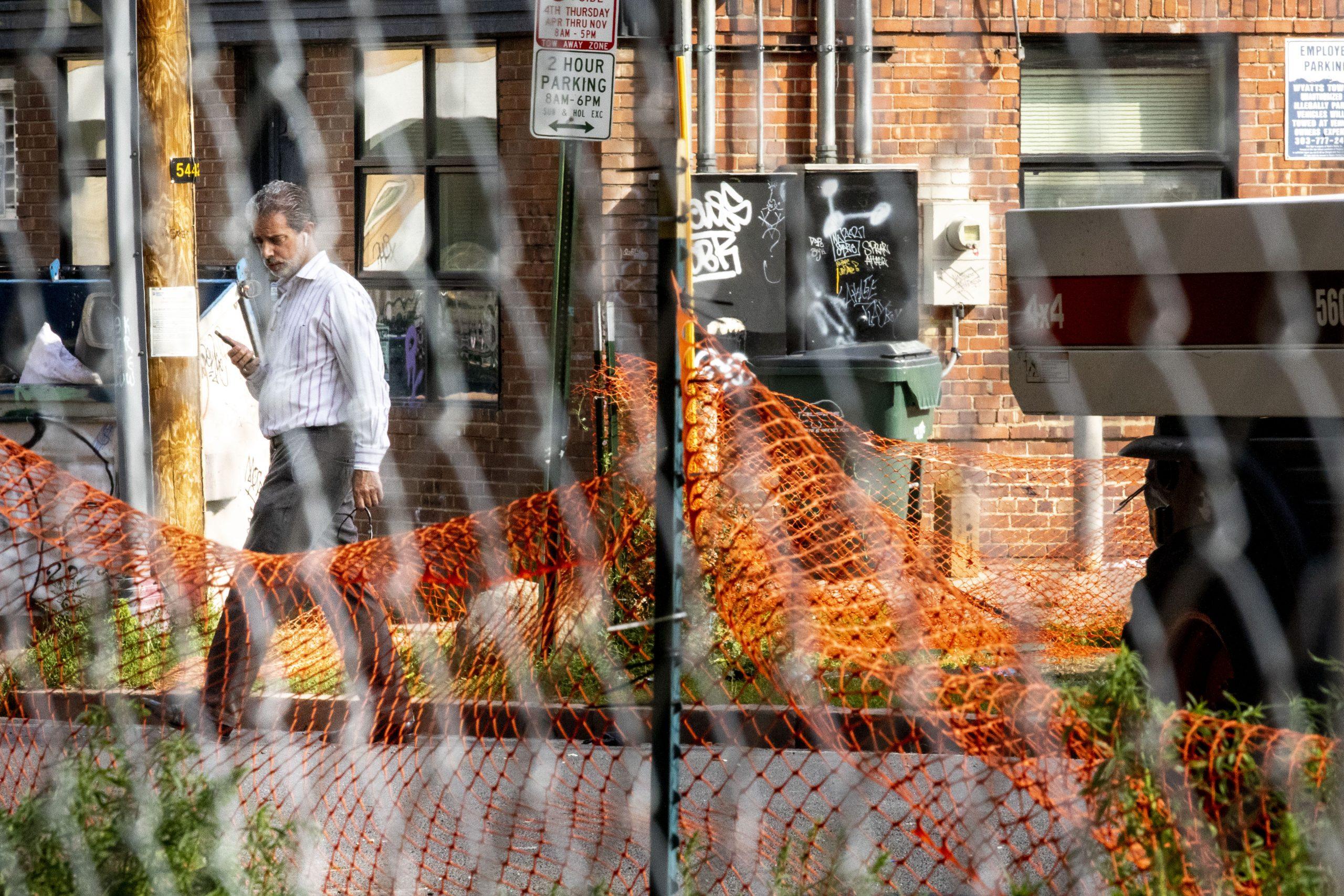
Every time I think I want to reconsider our approach to being aggressive and making sure we clean up encampments, I think about the pictures and the data that the people who've gone in to clean up have brought to me in terms of the risk, health risk. Propane tanks that are there, and if anything goes wrong, enough to level an entire block, a city block of people just sitting in their homes, not even concerning themselves with the people camped outside, but just in their homes. All of a sudden you got an explosion on your block that takes your house down, puts you, your children and your grandparents in danger. The amount of environmental hazards that exist in them. The felonious assaults that have occurred. The human trafficking that's occurring in those encampments.
I think if people truly saw, as we have seen, the stuff being pulled out of those encampments, they will clearly understand what the city is doing, if they would ask the question.
And the second thing I will tell you: Nowhere in the country has allowing encampments been a solution to encampments. They get progressively worse. And I have studied them, saw them face to face, eye to eye on my own: in Portland, San Francisco, D.C., Los Angeles and Chicago. They get progressively worse in terms of the environmental hazards that begin to pile up and exist.
You can bring Porta-Potties. You can bring cleaning. Because of the diversity of the challenges that people are facing in those encampments, they don't improve. It does get progressively worse.
And so when I saw them, I said, we will not be those cities. We're not going to let that happen here. And so while they move to other locations, I agree, I wish they would take us up on our offer of services and temporary and transitional shelter. But many of them don't. And we've got to face the fact that many people who are saying no to us are dealing with substance abuse issues and mental health issues. And it takes time. We've got to be repetitive, but we've got to continue our efforts to try to help them as best we can.
Denverite: Mike Johnston says he will end homelessness in four years. I'm curious what you think of that claim, and is it possible?
Hancock: Listen, I've known Mike Johnston for over 20 years, and he's someone I deeply respect and like. I consider him a friend. I'm glad he ran. And I'm glad he won. I think he's going to be a phenomenal mayor.
With that said, there are realities when you walk into this office, even someone like myself who served two terms on City Council, who has spent an inordinate amount of time in this office, meeting with mayors, consulting, advising, giving ideas -- I didn't understand until I became the mayor, the true realities of your limited resources, the real dynamics of communities who pushed back on the concept that you're going to bring a tiny home village to my community. We found it out. It's not as simple as people think it is. It's very complex. You're dealing with a lot of human-condition issues, and people are concerned about those conditions coming into their communities and the unknown, and they push back, and they push back hard.
And two: It's not like Denver has a lot of land. And the assessment of our inventory of land that we could possibly do these sort of things on, we did six, seven years ago. And that land that we had, we either had tiny home villages or have them, or we have helped to build affordable housing on those pieces of land or shelters. And so there's no land. We've done it.
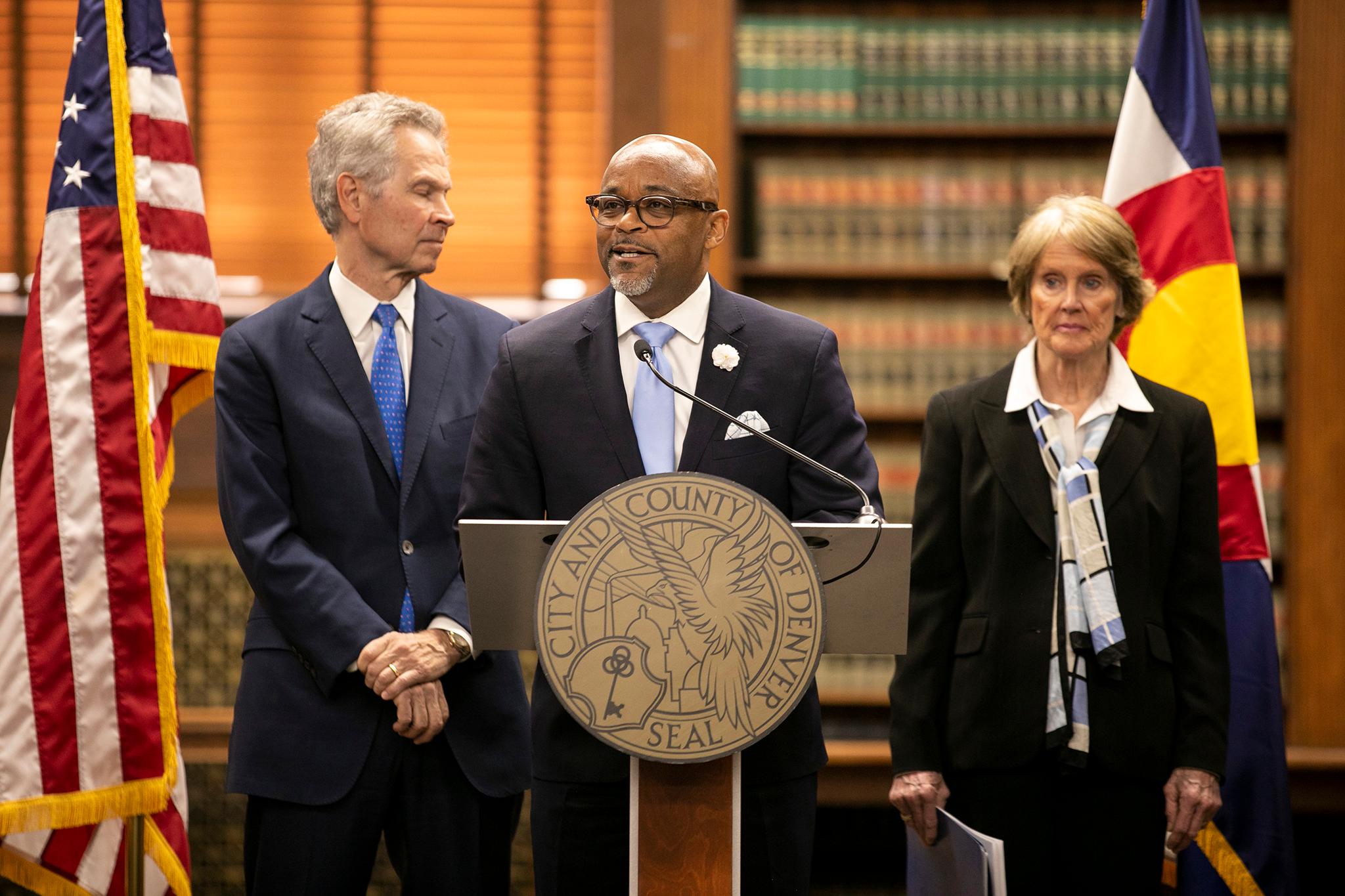
I think whether it was Mike or Kelly Brough who came to this office, they were going to see the realities of what it really means to manage this.
So I wish him the very best. I'm not the doubter. I love those kinds of grandiose ideas. If you don't have big, hairy, audacious ideas, then what do you have to pursue? So go do it. And hopefully you'll do something that no other city in the world has been able to do, and that is to end homelessness.
Denverite: Since 2010, Denver's paid an average of $1 million a year in police-related settlements, law enforcement settlements. That figure reached $3 million in 2022. What's your legacy as the head of law enforcement and public-safety efforts in Denver, in an era when taxpayers have been paying to settle so many law enforcement misconduct cases?
Hancock: I think wherever you have police, you're going to have law enforcement settlements. And to your point, you're talking about how they've increased. And so the first thing with the experience that I've had, I would ask the question: What was it that happened that increased the settlements that you have? And that's the unprecedented reckoning of excessive force cases and the George Floyd murders and the kind of protest that we have never seen in the streets of Denver. And unfortunately, some of the people who came down looking for confrontation got it. And unfortunately, there were some mistakes made on the police side, and we're paying for it as a city. It's unfortunate. But by the way, we're seeing it all over the country in cities -- the same type of settlements that are happening.
We have a phenomenal City Attorney's offices doing everything they can to wade through these. We have a phenomenal Finance Office that has done everything they can to prepare us for these potential settlements to get through it. Denver's prepared to continue to litigate, protect, and to serve as stewards of the trust of the treasury, while also recognizing that mistakes were made, and we are going to have to make some things right here, as best we can, going forward.

I think the legacy will be some bold things that we did in public safety. One is we brought in the first police chief from outside the department in 60 years. We went head to head and eye to eye to address issues of excessive force and said, there's never a time when excessive force is OK.
We revamped our excessive force policies, which, by the way, was based on a discipline matrix. Comparable discipline -- we got rid of all that, and we're going to take it case by case. A lot of things that came out during George Floyd -- the eight things that a city should be held accountable for, we had already accomplished seven and a half of those things. And we went back and said, "OK, we can pick up this other half that we don't have, like duty to report and those things that we had already addressed in the City of Denver and so forth."
We completely redid or went in and did a whole review of the Sheriff's Department and stepped down old policies, brought in new policies, discipline policies, and whole new operations around the Sheriff's Department, a new culture in the Sheriff's Department. Those are the things that I think 10, 15 years from now, people are going to look and go: "There were some bold things that were addressed through the Hancock administration around public safety to kind of do away with and bring forward really the expectation."
And finally, I'll tell you, the non-lethal response to people in crisis in the city, sending clinicians instead of police, armed officers to deal with someone having a crisis. Support Team Assisted Response, co-responder, those were groundbreaking. And now a lot of folks are focused on Denver studying how we brought it.
I get an email or text from a mayor almost every week asking, can you send me information on this? I want to know more about your STAR program. Denver was just spotlighted -- we didn't even know it -- at an international conference. And all of a sudden, I've got all these emails from mayors saying, talk to us about STAR. I want to know. I'm coming out to take a look at this.
So I'm proud of those things. So I think those are the things that people will look at and go, they took a comprehensive approach to dealing with crime and law and order in our city, including revamping our County Court, making it the most diverse court in the State of Colorado, including recognizing that it's got to be a whole approach: the economic, mental health, education -- all things necessary to understand how people find themselves involved in crime or ultimately becoming victims of crime.
Denverite: And what do you wish people in Denver knew about you that we don't?
Hancock: Oh man, I love this city. I just have a real passion for Denver. I love this city. And that got me up every day. That got me up even during the most difficult moments of serving -- the love of the city. It's almost like that loved one who sometimes just makes you so proud you can't stop smiling. And other times, when the relationship just goes bad and you're just angry, but you know, it's unconditional love and that we'll be back at this at some point.
I just love the city. There was never one day I got up and didn't want to come to work. The memories of being in this city, being in this office, every day something reminds me of something. I go, "Oh my God, remember that moment." We got a lot to unpack in terms of memories when I finally start writing a book.
Denverite: Top memory?
Hancock: Wow. Top memory? Top memory. When Barack Obama asked me to jump in the Beast with him, and, riding down in the motorcade with him and Gov. Hickenlooper at the time, and watching Hickenlooper tell joke after joke after joke.
At the time, we were in the middle of an effort to attract the Patent and Trademark Office to Denver. We were going after it. A lot of cities were going after it. We got the president of the United States sitting right here whose department is leading that effort. And Hickenlooper's telling these great jokes -- funny. But we got a ride from Buckley Air Force Base all the way to the Pepsi Center. We've got to get at least put it in front of him. And I couldn't get a word in edgewise because of Hickenlooper.
But finally I broke in when there was just a moment of brevity or quietness, and I said, "Mr. President, we're in the running for the Patent and Trademark office. We would be honored for Denver to have it here, and we want it. If you have any questions, call me directly. I want this thing." And he turned to his staff, and he said, "You got that?" And Denver got awarded it. I'm not saying it was because of that conversation, but I'm glad I got it in front of him.
Denverite: Anything else you want to speak to today?
Hancock: Tell the people of Denver, thank you. You gave a grown man his childhood dream, the privilege and honor to serve you, but to also serve with you. And we've come through some amazing moments together that quite frankly will probably never be repeated and certainly not in our lifetimes in terms of the unprecedented moments we had. And it's been a real honor being in the foxhole with the people of Denver.

